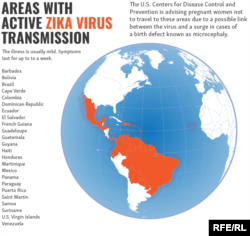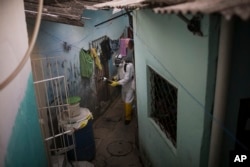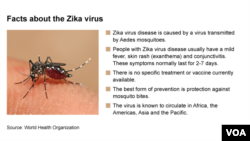The Zika virus is spreading rapidly in Latin America and Asian governments have issued advisories attempting to contain the mosquito-borne disease.
Zika could be linked to birth defects such as brain damage in newborns and could cause temporary paralysis, according to medical professionals.
Health authorities in several Asian countries have advised travelers, particularly pregnant women to avoid trips to Central and South America.
They have asked people coming or returning from those areas, who display symptoms such as fever and rashes to immediately report to health centers. Doctors are also required to immediately report suspected cases.
Meanwhile, Colombia's National Health Institute said that the country has recorded 20,297 cases of Zika infection, including 2,116 in pregnant women. In a statement released Saturday, the institute recommended that couples delay pregnancy for six to eight months.
The latest numbers, reported in the institute's epidemiological bulletin, would make Colombia the second most affected country in the region, after Brazil.
US, Brazil pledge to fight Zika together
In face of Zika outburst, the presidents of the United States and Brazil have agreed on "the importance of collaborative efforts" to combat the spread of the Zika virus.
After the two leaders spoke Friday, the White House issued a statement saying Barack Obama and Dilma Rouseff recognize the significance of working together "to deepen our knowledge, advance research, and accelerate work to develop better vaccines and other technologies to control the virus."
Virus spreading rapidly
The World Health Organization, U.S. Centers for Disease Control and the Pan American Health Organization warn the Zika virus is spreading rapidly through the Americas and could affect as many as four million people.
The Zika virus has been tentatively linked to 4,000 suspected cases of microcephaly in Brazil, a condition that results in abnormally small heads and brains in newborns. There is no treatment for microcephaly or the virus.
Infographic: Areas With Active Zika Virus Transmission (click to expand)
Brazil launches nationwide campaign
Rouseff announced Friday a nationwide attack on the Aedes Aegypti mosquito that transmits the Zika virus to humans. The Brazilian president has ordered an operation to eliminate mosquito breeding areas at all installations run by the the armed forces and at all federal educational, health and other facilities.
Rouseff encouraged Brazilians to join in the effort to stop the disease. "Everyone must do their part in to eliminate the breeding grounds," she said. "We will win this war."
Despite Obama and Rouseff's pledges to combine their efforts, scientists have warned it could take years to develop a Zika virus vaccine.
In the meantime, Brazil has turned to a British company, Oxitec, for help. According to The New York Times, Brazil recently approved the release of multiple groups of genetically modified Aedes Aegypti mosquitoes, created by Oxitec, throughout the country.
The idea behind the release of the mosquitoes is for the mature modified males to mate with females. Their offspring who inherited the modified gene would die, causing the mosquito population to dwindle and, hopefully, lower the threat of the disease.
4 million could be affected
The World Health Organization warns the Zika virus is spreading rapidly through the Americas and could affect as many as four million people.
The WHO says the virus has grown rapidly to a public-health threat of "alarming proportions." Julius Lutwana a virologist at the Uganda Virus Research Institute told VOA that the virus, which was first identified in Uganda in 1947, was long thought to pose only a small risk to humans.
The WHO says people with the Zika virus have a mild fever, skin rash and conjunctivitis (red eye) with symptoms lasting between two to seven days. The best prevention against Zika virus, experts say, is protection against mosquito bites as no vaccine or treatment is available.
Brazil reported its first Zika case in 2015.
Margaret Chan, the WHO's director general, said Thursday at a special meeting in Geneva that 23 countries and territories in the Americas region have reported Zika virus cases.
She said the Zika virus is “spreading explosively” in the Americas. She has called for an emergency meeting of experts Monday to determine measures to combat the spread of the virus.
Obama calls for quick response
In the United States, President Barack Obama has called for the rapid development of tests, vaccines and treatments for Zika infections.
Obama convened a meeting of senior health advisers to discuss the spread of the virus and its economic and developmental impact on the Americas.
The virus is named for the Zika forest in Uganda where the virus was first discovered in a monkey nearly 70 years ago. It was first believed to affect only primates, and when it was detected in humans, it seemed to cause only mild illness.
Outbreaks in Brazil and elsewhere in southern and central America have led to extensive spraying of insecticides to eradicate mosquitoes.
Warning to pregnant women
The U.S. Centers for Disease Control has warned pregnant women against traveling to areas with Zika virus outbreaks.
The WHO's regional office in the Americas said the most effective ways to stop the virus from spreading are to reduce mosquito breeding sites and for people to protect themselves from bites with insect repellent, nets, screens and clothing that covers as much of the body as possible.
Dr. Anthony Fauci, with the U.S. National Institutes of Health, said the NIH is "working with partners to accelerate research, disease diagnosis, vaccines and therapeutics."
He says that an existing vaccine platform that was proven safe with the West Nile virus could be repurposed for use in developing a vaccine for Zika. He added, however, that a completed vaccine is several years away.
WATCH: Dr. Fauci on Zika















